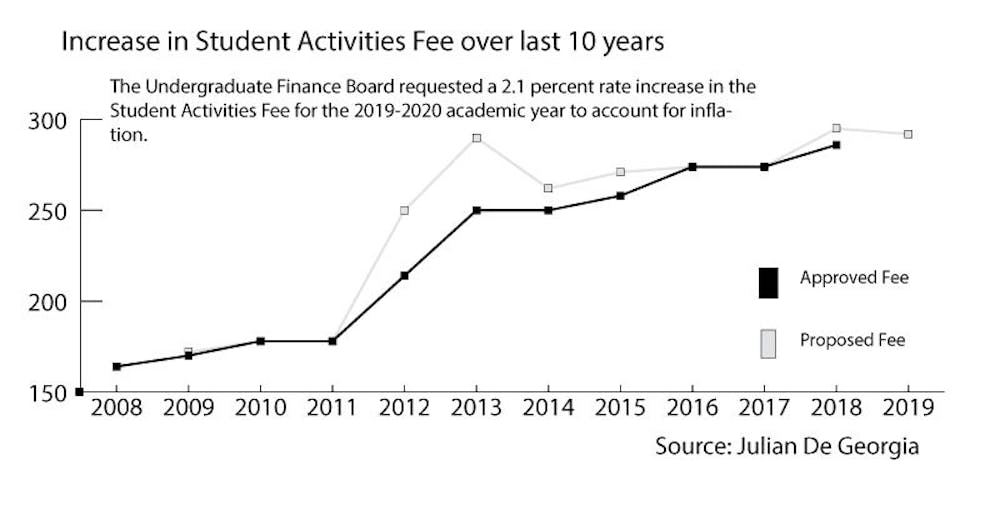The Undergraduate Council of Students voted unanimously at its general body meeting Wednesday evening to approve a proposal from the Undergraduate Finance Board to tie future yearly increases in the student activities fee to inflation.
The student activities fee is currently $286 per student per year, altogether forming UFB’s nearly $2 million budget, which funds approximately 250 student groups each year.
The new model for fee increases would raise the fee by $6 for the 2019-2020 academic year, and would reflect the 2.1 percent inflation rate reported by the U.S. Bureau of Labor Statistics in the first half of 2018.
“The main idea behind this is to limit the (student activities fee) increases to keep them from increasing beyond inflation and just make this whole process more consistent,” UFB Vice Chair Julian De Georgia ’20 said in a presentation to the general body.
The Board’s primary reasons for requesting changes to the student activities fee are inflation, requests from groups to organize more expensive activities and expansions in the number of groups funded by UFB, De Georgia said. In past years, the UFB chair and vice chair proposed changes to the fee “in order to accommodate the expected increases in spending for the next year,” he added, which led to “kind of arbitrary decisions.”
In 2011, for instance, the fee increased by $36, while in 2016 it did not increase at all, according to data presented by De Georgia at the meeting. “It’s difficult to understand or discern why these increases are happening at such different rates every year,” he added.
Linking increases of the activities fee to inflation “will reduce or completely eliminate arbitrary decisions,” De Georgia said. It will also ensure a more even distribution across class years of the burden imposed by fee increases, he added.
In response to a question from a general body member about how UFB plans to continue accommodating increases in the number of clubs, De Georgia said the Board will have to work to better allocate its funding. “The way that UFB has operated is … we kind of just give as much money as we can under (UFB) policies, and if student groups ask for more money under those policies, then as a result we simply increase the student activities fee,” De Georgia said. “We have a lot of money, I think the board should just do a better job of allocating the funds.”
UCS Appointments Chair Jason Carroll ’21 asked whether the fee increase would have any impact on expected family contribution calculations.
“The calculation for the family contribution is done separately from the expenses of Brown,” De Georgia said. “This wouldn’t affect that calculation at all.”
Vice President for Campus Life Eric Estes, who worked on the proposal with De Georgia and UFB Chair Lisa Schold ’19, will present the plan to the University Resource Committee, the group that recommends Brown’s annual budget to President Paxson P’19 and will make the final decision on any fee changes, De Georgia said.
The Board also received updates on the #FullDisclosure campaign, which proposed making information about the use of legacy status in the University’s admission process available to the public and pressed Brown to reexamine the role of legacy status in admission. Shawn Young ’19.5 and Joseph Vukel ’19, who helped coordinate the #FullDisclosure campaign, and UCS President Shanzé Tahir ’19 provided an update on the group’s work with the administration.
In last spring’s UCS elections, a referendum proposed by Young on behalf of #FullDisclosure passed with 81 percent of 2,355 student body votes, The Herald previously reported. The referendum asked whether the University should “disclose all internally written admissions policies and disaggregated data about legacy treatment” and “charge a joint committee of students, alumni and administrators to re-examine the use of legacy status in the admissions process.”
“UCS successfully advocated for a working group that is focused on access for (first-generation) and low-income students,” Tahir said. That working group will be chaired by Dean of Admission Logan Powell and include two students, two faculty members and two staff members from the Office of Admission, she added.
After the referendum, “we had a couple of conversations with Dean Powell and the Corporation … and they were all very willing to work with us,” Young said. “In the end, I think a (working group) that looks at access for first-gen(eration) and low-income students as a whole is in a way better than something that only has a narrow focus” on legacy status at Brown.





